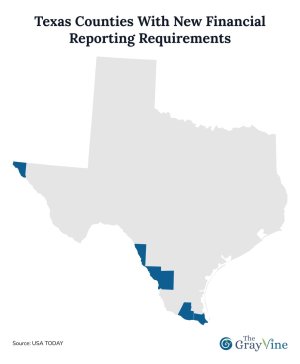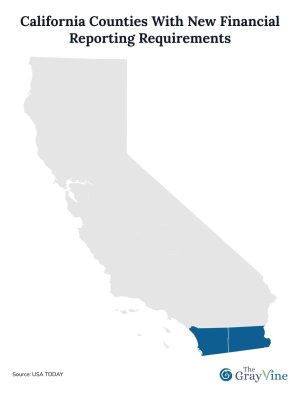New money rules just kicked in—See if your area is affected.
- Replies 0
In a world where every penny counts, especially for those who have worked hard to save for retirement, it's crucial to stay informed about changes that could affect your finances.
Recently, a significant shift in financial reporting requirements has emerged, and it's targeting 30 ZIP codes across two states.
If you're living in or conducting transactions within these areas, you need to pay close attention.
The Treasury Department's Financial Crimes Enforcement Network (FinCEN) has announced a new order that intensifies the scrutiny on financial transactions in an effort to clamp down on criminal activities, particularly those near the Southwest border.
Starting April 14, money services businesses—such as check cashing services, currency exchanges, and money wire companies—operating in the specified ZIP codes will be required to report any transactions over $200.
This is a drastic reduction from the previous $10,000 limit. The intent is to provide FinCEN with more data to track and prevent illicit activities like drug trafficking and money laundering.
Secretary of the Treasury Scott Bessent said that the order “underscores our deep concern with the significant risk to the US financial system of the cartels, drug traffickers, and other criminal actors along the Southwest border ... As part of a whole-of-government approach to combatting the threat, Treasury remains focused on leveraging all our available tools and authorities to better identify and counter these criminal activities.”

FinCEN has implemented new financial reporting requirements in selected ZIP codes in Texas and California to target criminal activity.
However, this move has sparked a debate. The Cato Institute, a libertarian think tank, has criticized the new order, suggesting that the $10,000 threshold was already low enough, particularly in light of inflation.
They argue that this increased financial surveillance is a step in the “wrong direction,” potentially ensnaring law-abiding citizens in a net intended for criminals.
"Yet, instead, we are seeing a drastic increase in financial surveillance, making the problem even worse," a Cato blog post stated.
The ZIP codes affected by this order span across two states, California and Texas, and include areas in Imperial County, San Diego County, Cameron County, El Paso County, Hidalgo County, Maverick County, and Webb County. Residents and businesses within these ZIP codes will be subject to the new reporting requirements until September 5.
You might be interested: Coming soon: Costco’s latest locations revealed—is your city on the list?
Here's a breakdown of the ZIP codes where these new rules apply:


If you're in one of these ZIP codes, it's essential to understand how these changes may impact your financial activities.
For instance, if you're used to making large cash deposits or withdrawals for legitimate reasons, you might find yourself having to provide additional information or facing more questions from your financial institution.
Moreover, for those of us who value privacy, this increased surveillance could feel intrusive.
Also read: This map shows if you're paying too much for healthcare: Is your home on the list?

Will you be affected by these new financial reporting rules? Do you have concerns about privacy or the implications for law-abiding citizens? Share your thoughts and experiences in the comments below!
Recently, a significant shift in financial reporting requirements has emerged, and it's targeting 30 ZIP codes across two states.
If you're living in or conducting transactions within these areas, you need to pay close attention.
The Treasury Department's Financial Crimes Enforcement Network (FinCEN) has announced a new order that intensifies the scrutiny on financial transactions in an effort to clamp down on criminal activities, particularly those near the Southwest border.
Starting April 14, money services businesses—such as check cashing services, currency exchanges, and money wire companies—operating in the specified ZIP codes will be required to report any transactions over $200.
This is a drastic reduction from the previous $10,000 limit. The intent is to provide FinCEN with more data to track and prevent illicit activities like drug trafficking and money laundering.
Secretary of the Treasury Scott Bessent said that the order “underscores our deep concern with the significant risk to the US financial system of the cartels, drug traffickers, and other criminal actors along the Southwest border ... As part of a whole-of-government approach to combatting the threat, Treasury remains focused on leveraging all our available tools and authorities to better identify and counter these criminal activities.”

FinCEN has implemented new financial reporting requirements in selected ZIP codes in Texas and California to target criminal activity. Image source: Mathieu Stern / Unsplash.
FinCEN has implemented new financial reporting requirements in selected ZIP codes in Texas and California to target criminal activity.
However, this move has sparked a debate. The Cato Institute, a libertarian think tank, has criticized the new order, suggesting that the $10,000 threshold was already low enough, particularly in light of inflation.
They argue that this increased financial surveillance is a step in the “wrong direction,” potentially ensnaring law-abiding citizens in a net intended for criminals.
"Yet, instead, we are seeing a drastic increase in financial surveillance, making the problem even worse," a Cato blog post stated.
The ZIP codes affected by this order span across two states, California and Texas, and include areas in Imperial County, San Diego County, Cameron County, El Paso County, Hidalgo County, Maverick County, and Webb County. Residents and businesses within these ZIP codes will be subject to the new reporting requirements until September 5.
You might be interested: Coming soon: Costco’s latest locations revealed—is your city on the list?
Here's a breakdown of the ZIP codes where these new rules apply:
- Imperial County, California: 92231, 92249, 92281, 92283
- San Diego County, California: 91910, 92101, 92113, 92117, 92126, 92154, 92173
- Cameron County, Texas: 78520, 78521
- El Paso County, Texas: 79901, 79902, 79903, 79905, 79907, 79935
- Hidalgo County, Texas: 78503, 78557, 78572, 78577, 78596
- Maverick County, Texas: 78852
- Webb County, Texas: 78040, 78041, 78043, 78045, 78046

Money services businesses in these areas must now report transactions over $200, a decrease from the previous $10,000 limit. Source: USA TODAY.

The Treasury Department believes this measure is crucial for addressing significant risks posed by criminal entities along the Southwest border. Source: USA TODAY.
If you're in one of these ZIP codes, it's essential to understand how these changes may impact your financial activities.
For instance, if you're used to making large cash deposits or withdrawals for legitimate reasons, you might find yourself having to provide additional information or facing more questions from your financial institution.
Moreover, for those of us who value privacy, this increased surveillance could feel intrusive.
Also read: This map shows if you're paying too much for healthcare: Is your home on the list?
Key Takeaways
- FinCEN has implemented new financial reporting requirements in selected ZIP codes in Texas and California to target criminal activity.
- Money services businesses in these areas must now report transactions over $200, a decrease from the previous $10,000 limit.
- The Treasury Department believes this measure is crucial for addressing significant risks posed by criminal entities along the Southwest border.
- Critics, such as the Cato Institute, argue that this increased financial surveillance represents a move in the wrong direction and exacerbates existing problems with the financial threshold.
Will you be affected by these new financial reporting rules? Do you have concerns about privacy or the implications for law-abiding citizens? Share your thoughts and experiences in the comments below!






